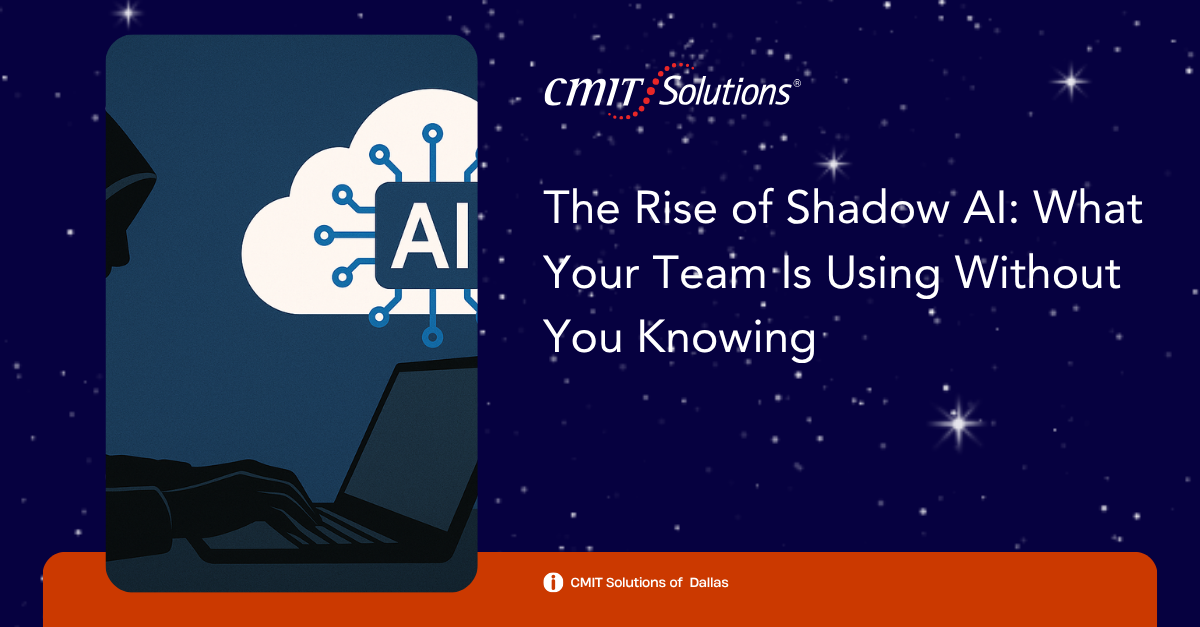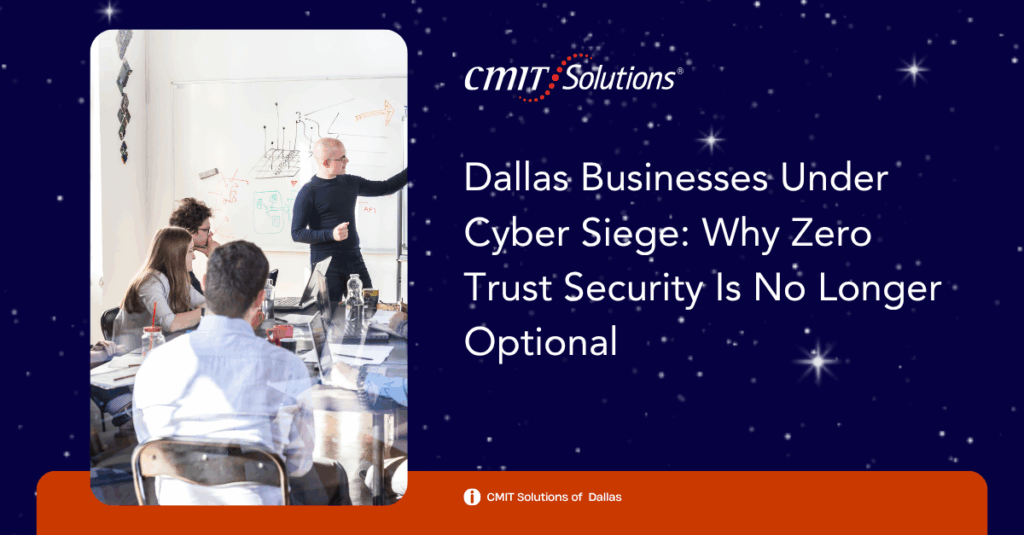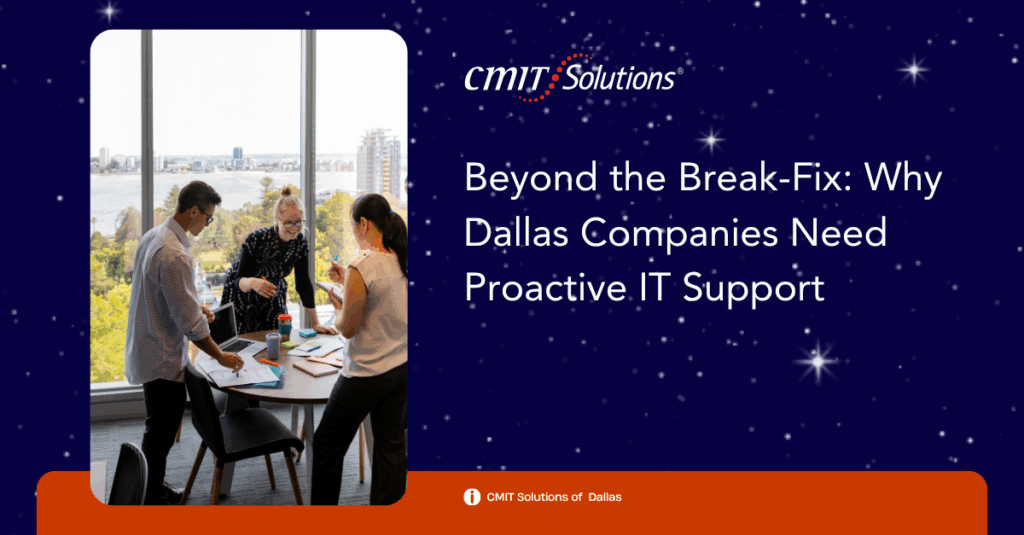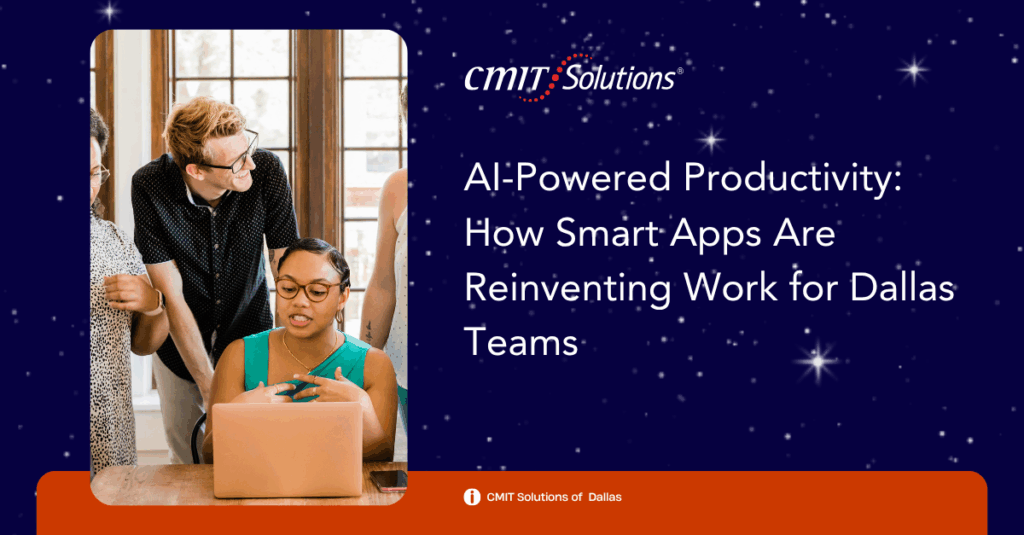Artificial intelligence (AI) has rapidly transformed how businesses operate, enhancing productivity, automating tasks, and accelerating decision-making. But as AI becomes increasingly accessible, a concerning trend is emerging within the workplace: shadow AI.
Shadow AI refers to the use of AI tools and platforms by employees without the knowledge or approval of their organization’s IT department. This phenomenon mirrors the earlier rise of shadow IT, where staff used unauthorized hardware or software to get work done. And just like its predecessor, shadow AI poses serious risks to security, compliance, and operational integrity.
What Is Shadow AI?
Shadow AI refers to artificial intelligence tools, platforms, or applications that employees use without formal approval or oversight from the company’s IT or compliance departments. These tools can include free online chatbots, AI-powered scheduling assistants, automated content creators, and more. While often helpful in improving workflow efficiency, these tools operate outside official channels, making them difficult to monitor, assess, or secure.
Unlike traditional IT systems that require installation, licenses, or internal onboarding, shadow AI tools are often cloud-based, requiring nothing more than a browser and a few minutes of signup time. This ease of access is part of the appeal—but also part of the danger. Organizations may be unaware that sensitive information is being uploaded to third-party platforms with unknown security protocols. When left unchecked, shadow AI can undermine cybersecurity protocols, breach compliance standards, and expose proprietary data to external threats.
Understanding what constitutes shadow AI is the first step toward managing it effectively. And with tailored managed IT services, companies can bring hidden AI use into the light without stifling innovation.
Employee Attraction to AI
AI tools appeal to employees for several reasons—chief among them being speed, convenience, and autonomy. With free and easy access to tools like ChatGPT, Notion AI, or Jasper, staff can perform advanced tasks without needing to involve the IT department. When employees face mounting workloads and tight deadlines, they naturally seek out productivity hacks. Shadow AI provides instant help.
The root of the issue isn’t defiance—it’s a mismatch between IT-provided tools and what employees believe they need to excel. Without sufficient internal options, users will seek what they consider safe and easy solutions elsewhere. Unfortunately, this unintentionally opens the door to compliance and cybersecurity risks.
Many organizations are responding by offering sanctioned tools with documented controls. With guidance from CMIT Solutions of Dallas, businesses can give their teams the tools they want—while ensuring safety, privacy, and oversight.
Unseen Cybersecurity Exposure
Shadow AI dramatically broadens a company’s attack surface. AI platforms often require users to upload content for processing—this could include emails, meeting notes, or proprietary files. If these platforms are not secured or do not comply with internal protocols, organizations risk exposing sensitive data.
Moreover, many free AI tools do not disclose how they store or use uploaded data. Some retain content to improve their models, which may involve storing it across global data centers with unknown access controls. Shadow AI thus creates a backdoor through which trade secrets, client information, or PII (personally identifiable information) might leak.
Cybersecurity isn’t just about firewalls anymore. It’s about knowing where data is going—and with shadow AI, that clarity vanishes. Fortunately, our managed IT services provide the controls and visibility needed to detect these hidden threats.
Legal Compliance in Jeopardy
Shadow AI becomes even riskier in regulated sectors like healthcare, legal, and finance. These industries are governed by laws such as HIPAA, SOX, or GDPR. When employees use AI to process or summarize patient data, financial statements, or legal opinions—without official approval—they may inadvertently break the law.
Even simple actions—like using AI to draft internal policies—can introduce legal complications if they involve confidential HR records. For companies under compliance mandates, shadow AI is a ticking time bomb. Regulators won’t be lenient if violations stem from tools the company failed to monitor.
With CMIT Solutions of Dallas, organizations can implement governance frameworks that prevent such breaches before they occur. Compliance doesn’t have to be a reactive fire drill—it can be a proactive strategy.
Blurred Visibility for IT Teams
Traditional IT infrastructures rely on visibility. Firewalls, access controls, and logging systems help IT teams understand who is using what, when, and how. Shadow AI disrupts that model by slipping through monitoring blind spots.
AI tools used in browsers or mobile apps may never touch the company network. They don’t require installations or admin permissions, making them difficult to track. The result is a parallel tech ecosystem—a ghost layer of unregulated, unmonitored software.
IT teams are left playing catch-up, unaware of data movement, file exports, or AI-generated content. CMIT Solutions of Dallas helps businesses reclaim visibility with modern tools that detect and manage shadow usage across cloud and mobile environments.
Explore our resource center to see how we help businesses modernize their infrastructure without losing control.
Productivity Versus Risk
It’s tempting to see AI tools solely as enhancers of productivity. They reduce the time needed to draft emails, summarize documents, generate graphics, or process data. However, productivity gains that bypass IT approval can become double-edged swords.
Consider a team using an AI-powered meeting assistant. It transcribes and summarizes conversations in real time—great for saving time, but what if that assistant stores data in unsecured servers overseas? Or what if confidential business plans are used to train third-party models?
Businesses must weigh convenience against control. The solution isn’t banning innovation—it’s managing it. With IT services from CMIT Dallas, companies can adopt AI responsibly, ensuring teams remain both agile and secure.
Creating Policy-Driven AI Frameworks
One of the most effective responses to shadow AI is building official AI usage policies. These don’t need to be overly technical or restrictive—they just need to be clear. Define what tools are allowed, what data can be processed through AI, and what approval paths are required for new software.
Make the policy practical. Encourage employees to request tools they find useful, and create a fast-track review process. When people know they can get the tools they need safely, they’re less likely to go rogue.
A solid policy creates a safety net that protects both the business and its workforce. We assist Dallas-area organizations in crafting practical AI policies as part of our broader IT guidance.
The Advantages of Sanctioned AI Use
When AI is integrated thoughtfully into the workplace, with the right checks and balances, the benefits can be tremendous. Companies that encourage responsible AI adoption while enforcing strong governance frameworks can enjoy:
- Increased productivity: AI tools automate routine tasks, freeing employees to focus on strategic work.
- Enhanced decision-making: Data-driven insights powered by AI help leaders make smarter, faster choices.
- Improved compliance: Approved tools meet security and legal standards, reducing regulatory risk.
- Greater innovation: Employees can safely experiment with new solutions, driving business creativity.
- Stronger collaboration: AI-powered platforms enable smoother workflows and communication between teams.
- Cost savings: Automation reduces overhead and minimizes reliance on manual processes.
These advantages show that AI doesn’t have to be a threat—it can be a growth engine. The key lies in using it responsibly with support from trusted partners like CMIT Solutions of Dallas.. These don’t need to be overly technical or restrictive—they just need to be clear. Define what tools are allowed, what data can be processed through AI, and what approval paths are required for new software.
Make the policy practical. Encourage employees to request tools they find useful, and create a fast-track review process. When people know they can get the tools they need safely, they’re less likely to go rogue.
A solid policy creates a safety net that protects both the business and its workforce. We assist Dallas-area organizations in crafting practical AI policies as part of our broader IT guidance.
Training and Transparency for Long-Term Success
Policies alone aren’t enough. For shadow AI to be addressed fully, employees need training and consistent communication. Many use these tools not out of recklessness but because they genuinely don’t understand the risks.
That’s why it’s vital to host regular training sessions, share case studies, and keep communication channels open. Educate staff on safe AI practices and what’s at stake if those guidelines are ignored.
Create a culture where people feel safe discussing new tools, asking questions, or reporting risky behavior. Transparency is key. And if you need help getting started, CMIT Solutions of Dallas offers tailored consulting to get your team aligned.
Conclusion: Don’t Let Shadow AI Catch You Off Guard
The rise of shadow AI presents both an opportunity and a risk. By proactively identifying usage, implementing safeguards, and engaging employees, organizations can harness the benefits of AI while avoiding its pitfalls.
Whether you need a full IT overhaul or just a second opinion on your current environment, CMIT Solutions of Dallas is here to help. Contact our team through our support hub and let’s build a future where technology empowers, not endangers, your business.
Stay updated on AI trends and best practices through our blog and resource center.







